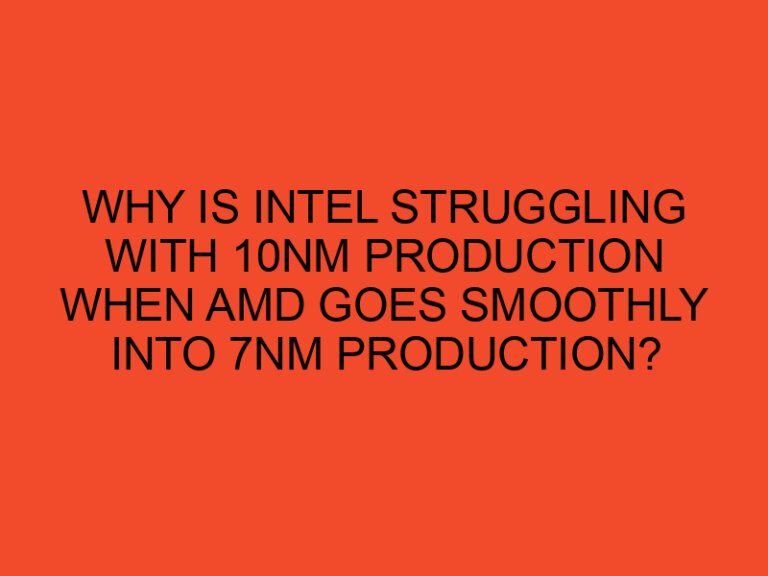In today’s world, computers have become an integral part of our daily lives. They are used for various purposes, including work, entertainment, communication, and education. The performance of a computer largely depends on the processor, which is the brain of the computer. One of the important specifications that determine the performance of a processor is its clock speed, measured in GHz. In this article, we will discuss what GHz means, how it affects the performance of a processor, and what the highest GHz processor currently available is.
Table of Contents
- 1. Understanding Processor Clock Speeds
- 2. Factors Affecting Processor Performance
- 3. What is GHz?
- 4. The Importance of GHz in Processor Performance
- 5. What is the Highest GHz Processor Currently Available?
- 6. Future of Processor Technology
- 7. Pros and Cons of High GHz Processors
- 8. Choosing the Right Processor for Your Needs
- 9. Overclocking: Pushing Your Processor to the Limits
- 10. How to Monitor Processor Speed
- 11. Conclusion
- 12. FAQs
1. Understanding Processor Clock Speeds
Before we dive into GHz, let’s first understand what a clock speed is. The clock speed of a processor is the rate at which it can perform a certain number of operations per second. The higher the clock speed, the faster the processor can execute instructions. The clock speed is usually measured in gigahertz (GHz), with one GHz being equal to one billion cycles per second.
2. Factors Affecting Processor Performance
While clock speed is an important factor in determining processor performance, it is not the only factor. Other factors, such as the number of cores, cache size, and architecture, also play a significant role. The number of cores determines how many tasks a processor can handle simultaneously, while cache size determines how quickly data can be accessed. The architecture of a processor determines how efficiently it can execute instructions.
3. What is GHz?
As mentioned earlier, GHz stands for gigahertz, which is a measure of frequency equal to one billion cycles per second. It is a unit of measurement for the clock speed of a processor, indicating how many cycles it can execute per second. A higher GHz means that the processor can execute more cycles per second, making it faster.
4. The Importance of GHz in Processor Performance
While GHz is not the only factor that determines processor performance, it is an important one. A higher GHz means that the processor can execute more instructions per second, making it faster. However, it is important to note that GHz alone does not determine the overall performance of a processor. Other factors, such as the number of cores, cache size, and architecture, also play a significant role.
5. What is the Highest GHz Processor Currently Available?
The highest GHz processor currently available is the Intel Core i9-11900K, which has a base clock speed of 3.5 GHz and can be boosted up to 5.3 GHz. This processor has eight cores and 16 threads, making it suitable for heavy workloads such as gaming, video editing, and 3D modeling. It also has a cache size of 16 MB and supports PCIe 4.0, which provides faster data transfer speeds.
6. Future of Processor Technology
Processor technology is constantly evolving, with new processors being released every year. With the advent of artificial intelligence, machine learning, and big data, the demand for faster and more efficient processors is increasing. In the future, we can expect to see processors with even higher GHz and more cores, as well as improved architecture and cache size.
7. Pros and Cons of High GHz Processors
While high GHz processors offer faster processing speeds, there are also some drawbacks to consider. One of the main disadvantages of high GHz processors is their higher power consumption, which can lead to increased heat generation and shorter battery life. Additionally, high GHz processors are often more expensive than their lower GHz counterparts, making them less accessible to budget-conscious consumers.
However, high GHz processors are ideal for power users who demand fast and efficient processing speeds. They are particularly useful for tasks such as gaming, video editing, and 3D modeling, which require a high degree of processing power. For everyday tasks such as browsing the internet, checking emails, and word processing, a lower GHz processor may be sufficient.
8. Choosing the Right Processor for Your Needs
When choosing a processor, it is important to consider your specific needs and budget. If you are a power user who demands fast and efficient processing speeds, a high GHz processor may be the right choice for you. However, if you are a casual user who mainly uses your computer for everyday tasks, a lower GHz processor may be sufficient and more cost-effective.
Other factors to consider when choosing a processor include the number of cores, cache size, and architecture. Additionally, it is important to ensure that the processor is compatible with your motherboard and other components.
9. Overclocking: Pushing Your Processor to the Limits
Overclocking is the process of increasing the clock speed of a processor beyond its rated speed. This can lead to faster processing speeds but also increases the risk of damage to the processor and other components. Overclocking is usually done by enthusiasts and power users who want to push their systems to the limits.
If you are interested in overclocking, it is important to research the process thoroughly and ensure that your components are capable of handling the increased clock speed. Overclocking can also void your warranty, so proceed with caution.
10. How to Monitor Processor Speed
There are several tools available for monitoring your processor speed, including built-in utilities in Windows and third-party software. The Windows Task Manager provides basic information about your processor speed, while software such as CPU-Z and HWMonitor offer more detailed information.
Monitoring your processor speed can help you identify performance issues and ensure that your system is running at its optimal speed.
11. Conclusion
The clock speed of a processor, measured in GHz, is an important factor in determining its performance. While a higher GHz means faster processing speeds, it is not the only factor to consider. Other factors such as the number of cores, cache size, and architecture also play a significant role.
The highest GHz processor currently available is the Intel Core i9-11900K, which has a base clock speed of 3.5 GHz and can be boosted up to 5.3 GHz. However, it is important to choose a processor that meets your specific needs and budget, as well as ensuring that it is compatible with your other components.
12. FAQs
- What is the difference between clock speed and core count?
- Clock speed is the rate at which a processor can perform a certain number of operations per second, while core count determines how many tasks a processor can handle simultaneously.
- Is a higher GHz always better?
- Not necessarily. While a higher GHz means faster processing speeds, it is not the only factor to consider. Other factors such as the number of cores, cache size, and architecture also play a significant role.
- Can I upgrade my processor to a higher GHz?
- It depends on your system’s motherboard and other components. Upgrading your processor may also require additional cooling and power supply.
- What is the difference between a desktop and a laptop processor?
- Desktop processors are generally more powerful than laptop processors, but they also consume more power






